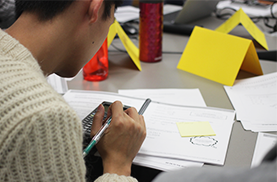Countdown to May with AP Exam Tips
April 23, 2018
 Our students and teachers prepare for Advanced Placement exams all year, yet test day can still feel daunting. Whether they’ve studied all year long or are down-to-the-wire cramming, every student could use a little extra encouragement before they get to show off what they know.
Our students and teachers prepare for Advanced Placement exams all year, yet test day can still feel daunting. Whether they’ve studied all year long or are down-to-the-wire cramming, every student could use a little extra encouragement before they get to show off what they know.
As we count down to the first AP exam on May 7, our rock star teachers and presenters share their best AP exam tips.
Make sure to check back every Monday in April for a new set of tips! So far, we've covered math, science and English.

Tips for Math Exams:

When working with a calculator FRQ, I encourage my students to put the equations into a calculator and immediately go to the window to set the x-min and x-max to the interval given in the stem. That way they aren't wasting time looking at a portion of the graph that is irrelevant to the upcoming questions.
-Kim Fudge, AP Calculus | Richland High School (Richland, TX)

In my opinion, Sampling Distributions are the 'tie that binds' the entire course together. A solid understanding of their foundations, characteristics and how they change based on a variety of factors is at the core of statistical competency.
-Dave Gibbs, AP Statistics | Veterans High School (Kathleen, GA)

For AP Calculus, we have several non-negotiable big topics. Most are covered well in textbooks, but a few that often are not laid out clearly in texts include: applications of FTC (accumulation), particle motion, multiple representations, conceptual/abstract problems on any given topic.
-Bryan Passwater, AP Calculus | AP-TIP IN (IN)

Tips for English Exams:

What really helped my students was having them create their own AP-style exams. Students had to create multiple-choice AP style questions, answer choices, and answer explanations/rationales. Students also had to create AP style essay prompts and sample responses.
-Denise King, AP Language and Composition | Maynard Jackson High School (Atlanta, GA)

I really encourage my students to change the way that they approach the writing and the multiple choice. The process of elimination is important – there’s a lot of vocabulary on the test that you may not know. If you can eliminate, then it’s okay.
-Rikki Carr, AP Literature & Composition | Northwestern Senior High School (Albion, PA)

Practice, practice, practice. How do you get better at sports, music or anything? You’ve got to practice. It’s the same thing with academic pursuits. You get better at writing when you practice writing.
-Sheryl Dawson, AP Language and Composition | Henderson County High School (Henderson, KY)

Tips for Science Exams:

When studying for the exam, students need to remember that memorizing vocabulary is not very helpful by itself – they need to keep asking themselves, 'how is connected to ?'. If they can make connections between the different ideas in the class, they will be more successful on the AP MC Exam.
-Mathew Wells, AP Environmental Science | Cypress Lakes High School (Katy, TX)

In AP Physics, students need to make sure they have a firm grasp of dynamics (forces). Secondly, students need to make sure they understand how energy, dynamics and momentum work together.
-Christian Horner, AP Physics | Westfield High School (Westfield, IN)

AP Biology students must be knowledgeable in concepts related to evolution and natural selection. The principles of evolution are woven throughout the curriculum and can easily be linked to any question or experimental analysis. I decided a few years back to start my instructional calendar with evolution so that my students can see evidence of those principles throughout the year.
-John McCall, AP Biology | Maynard Jackson High School (Atlanta, GA)

 Did you find a helpful tip? Feel free to share these with a student or teacher who would benefit from some expert advice and sign up for our monthly newsletter for subject-specific content like this!
Did you find a helpful tip? Feel free to share these with a student or teacher who would benefit from some expert advice and sign up for our monthly newsletter for subject-specific content like this!
Please help us provide the best content by answering this one-question survey. Click the Let's Get Started button to chime in.